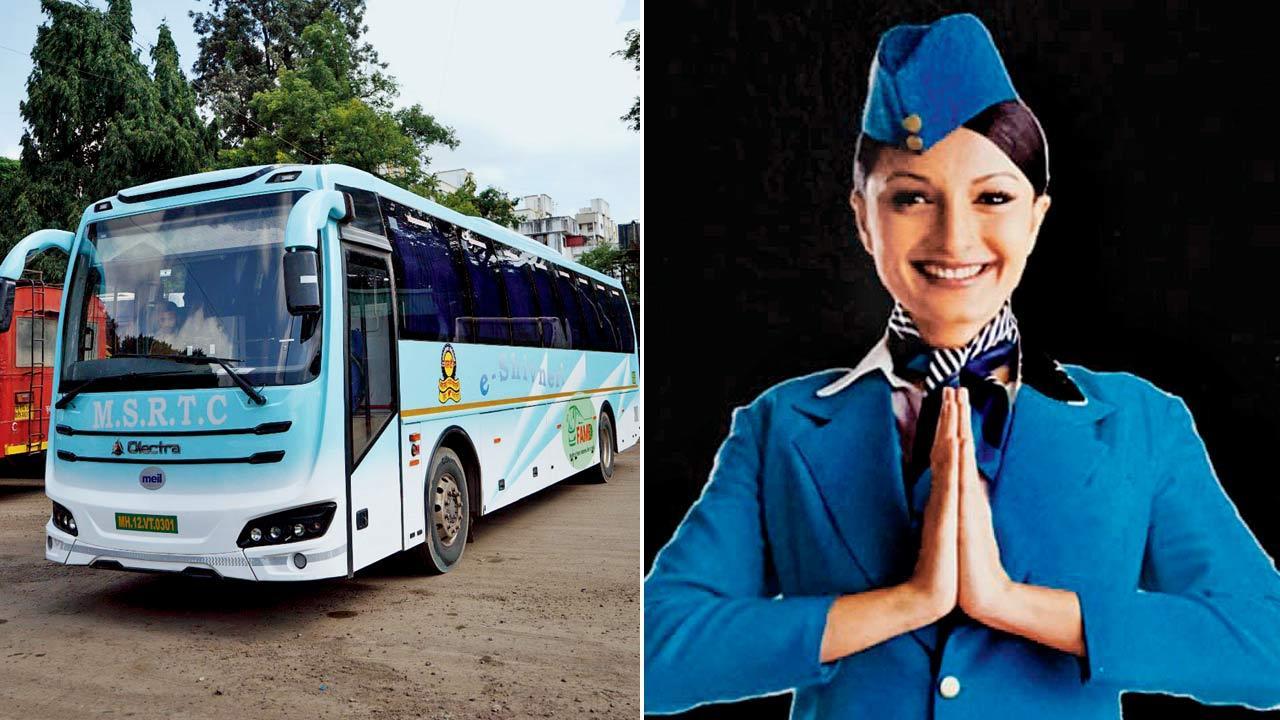The concept of Shivneri Sundaris for passengers makes perfect sense in a country constantly reaching for the past

The Maharashtra State Road Transport Corporation had announced, in October, the launch of a ‘Shivneri Sundari’ service on its e-Shivneri buses on the lines of airline-like hospitality. PICS/MSRTC on X. Imaging/Yogesh Jain
 For many of us lucky enough to have taken an ST bus (short for State Transport, from the Maharashtra State Road Transport Corporation), there’s nothing like those magical vehicles anywhere in India. If Bihar can boast of building sturdy bridges, and Gujarat can speak of sending the bravest men to the Army, Maharashtra can put forth its fleet of MSRTC buses as a source of state pride. One can spot them from a mile away, gleaming under flyovers in Dadar or Parel as they prepare to carry thousands of satisfied passengers across the state’s flawless highways. Now, as if those pristine vehicles weren’t enough, MSRTC officials have come up with a way of making rides between Bombay and Pune even more pleasant:
For many of us lucky enough to have taken an ST bus (short for State Transport, from the Maharashtra State Road Transport Corporation), there’s nothing like those magical vehicles anywhere in India. If Bihar can boast of building sturdy bridges, and Gujarat can speak of sending the bravest men to the Army, Maharashtra can put forth its fleet of MSRTC buses as a source of state pride. One can spot them from a mile away, gleaming under flyovers in Dadar or Parel as they prepare to carry thousands of satisfied passengers across the state’s flawless highways. Now, as if those pristine vehicles weren’t enough, MSRTC officials have come up with a way of making rides between Bombay and Pune even more pleasant:
ADVERTISEMENT
Trained hostesses!
They are to be called Shivneri Sundaris, apparently, because they will work their magic on e-Shivneri buses. It’s heartening to think of the advertising agency that walked away with a large taxpayer-funded cheque for coming up with that particular bon mot. Given the other buses in the MSRTC stable, I foresee marketing campaigns for Ashwamedh Ashwinis, Parivartan Parvatis, Bhimashankar Bhoomis and Shivshahi Shalinis looming on the horizon. It’s the future, whether we’re ready for it or not.
The Sundaris in question will supposedly welcome and offer passengers high-quality assistance during their journeys. They will presumably provide high-quality travel-related information, tackle queries with high-quality responses, take suggestions and feedback with a high-quality attitude, and help with basic amenities like water, newspapers, and magazines, according to an unnamed MSRTC official quoted in multiple reports. That’s not all though. Sundaris will also ensure cleanliness on these buses, monitor air-conditioning and temperature, and inform authorities of technical issues. They will be equipped with first aid and medical kits to offer basic medical assistance, if required. For high-quality medical help, passengers will probably have to rely on old-fashioned doctors.
This couldn’t have been a quick decision. It must have involved hundreds of fruitful meetings and hours of brainstorming. Our already overworked officials must have had to stay way past lunch hour on multiple days to flesh out the plan’s finer points. It says a lot that they could find nothing else that required urgent attention, which makes me believe that the one thing passengers must have needed most on ST buses was a woman to serve them something.
I can see why most normal people would baulk at an idea so seemingly regressive, pointless and reeking of misogyny. I can see why they would accuse those enlightened, erudite MSRTC officials of dragging society into the medieval era. What they don’t understand is that these are foundational principles when it comes to governmental bodies tasked with managing travel across Maharashtra. Ask any woman in your family if they agree or disagree. Why pick on one campaign when the whole edifice is rotten?
Women aren’t given much thought when it comes to anything in this state, despite what full-page government-sponsored advertisements may proclaim. There are ministries and departments allegedly dedicated to their welfare, of course, because that is the sort of thing international organisations tend to focus on while rating a state. All that bureaucracy means nothing to the average female traveller because it cannot guarantee a safe, calm, or pleasant commute anywhere. So, if the MSRTC wants to treat women as commodities and reduce them to the status of props, it isn’t that far from how most women without means believe they are treated regularly anyway. This is not a country that believes women should use public transport.
Then again, maybe I’m looking at this the wrong way. Maybe the Sundaris are a first step towards the unfolding of a larger plan. Maybe what the MSRTC wants to do is start with the big picture and then focus on granular details. First, hostesses, then smaller issues like cleanliness, food quality and employee welfare. I’m not optimistic, but maybe I should be. After all, our central government has also introduced schemes that were initially criticised but eventually accepted as beneficial. PM Cares comes to mind, for all the good it has done for at least one or two individuals.
I must end this column with a suggestion. If Maharashtra’s bureaucrats want to start something, they should try it themselves first. If they can’t, for whatever reason, they should nominate a female member of their family to take the plunge. It is only fair that they also have journeys as pleasant as the ones enjoyed by thousands of citizens who step into ST buses daily.
When he isn’t ranting about all things Mumbai, Lindsay Pereira can be almost sweet. He tweets @lindsaypereira
Send your feedback to mailbag@mid-day.com
The views expressed in this column are the individual’s and don’t represent those of the paper
 Subscribe today by clicking the link and stay updated with the latest news!" Click here!
Subscribe today by clicking the link and stay updated with the latest news!" Click here!







